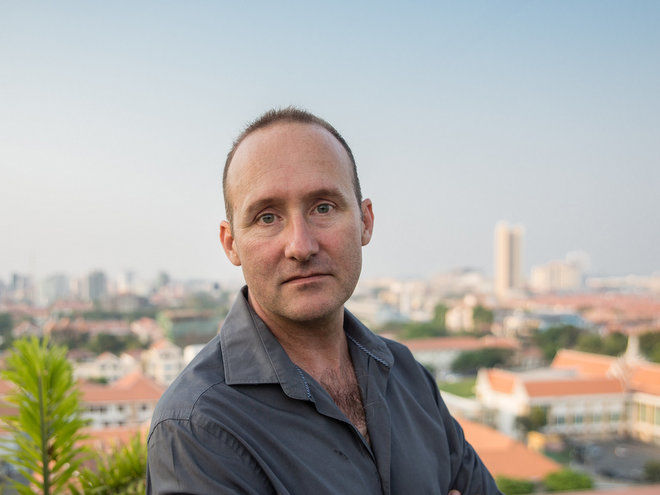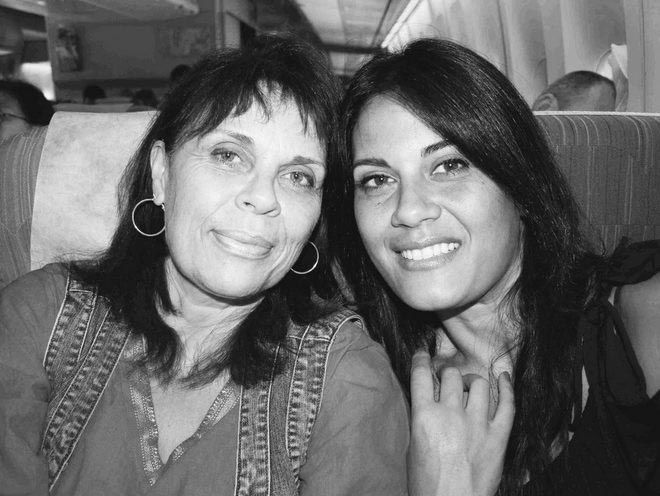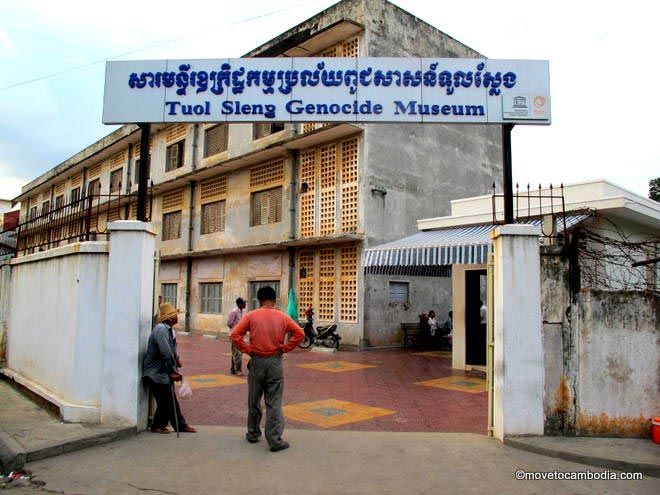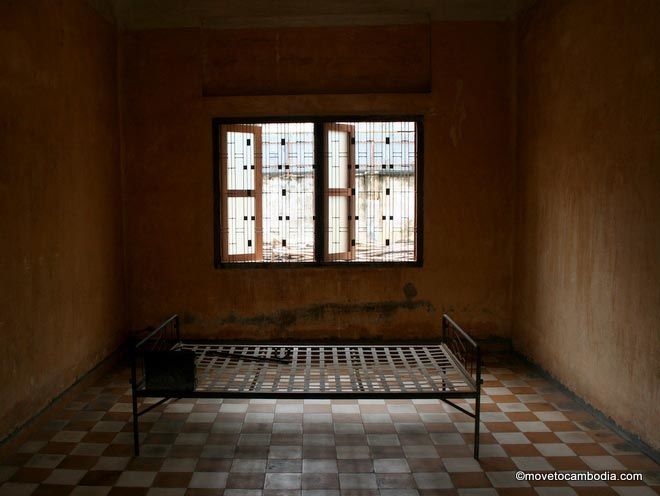With When Clouds Fell From the Sky, a book released earlier this year, journalist Robert Carmichael gives a compelling account of a Cambodian diplomat who disappeared in Democratic Kampuchea, and his family’s decades-long search to find out what happened to him during the reign of the Khmer Rouge. If you haven’t read it yet, read our full review of When Clouds Fell From the Sky. I caught up with author Robert Carmichael and talked to him about the book.

Author Robert Carmichael in Phnom Penh. Photo by Anna Clare Spelman.
MTC: How did you come to write When Clouds Fell From the Sky?
RC: I didn’t write the first draft until 2012, more than a decade after I first lived in Cambodia. I’d worked here between 2001-2003 as the managing editor of the Phnom Penh Post newspaper. I then left Cambodia — for good, I thought at the time — but ended up returning in early 2009 to cover the war crimes trial of Comrade Duch, the commandant of the Khmer Rouge’s most notorious prison code-named S-21. I met the two women, Martine Lefeuvre and her daughter Neary Ouk, whose life stories are at the center of my book quite by accident over breakfast along the riverside in Phnom Penh just days before Duch’s trial began in 2009. The idea for a book that would encompass Duch’s trial, Neary’s and Martine’s stories, and Cambodia’s history took shape over the following year.
MTC: In the book, you explore the idea of ambiguous loss, and how much pain this lack of closure has caused family members of Khmer Rouge victims. Can you tell us a little bit more about this?
RC: “Ambiguous loss” is a term used to describe how people cope with the disappearance (and presumed death, rather than the provable death) of a loved one — and that was an all-too-common occurrence under the Khmer Rouge. With no proof of death, no body, relatives typically cling to the hope that their loved one is still alive, and that in turn prevents them from being able to mourn properly. Ambiguous loss has been described as “the most devastating [of all losses in personal relationships] because it remains unclear, indeterminate.” It took years before Neary found out what had happened to her father, Ket.
The damage done by ambiguous loss is compounded — as Neary told me of her father’s disappearance into Duch’s prison S-21 — by continually running through in one’s mind all of the horrors to which the victim might have been subjected. In a place like S-21, the list of potential horrors was long indeed.

Martine and Neary, whose story When Clouds Fell From the Sky revolves around. Photo courtesy of Neary Ouk.
MTC: Do you think the Khmer Rouge tribunal has been successful in providing closure to victims? What lessons can we learn from the tribunal?
RC: That depends on the person assessing it. For some victims and survivors, it has been a useful, even vital, part of coming to terms with what happened to them or to their loved ones. For others it has varied from less useful to being of no use at all.
For Neary and Martine the tribunal, while imperfect, was helpful on certain levels. But it can never undo what was done, and that impossible task really is the only perfect solution.
As for lessons learned: it’s important to acknowledge that tribunals (or truth and reconciliation commissions, as my country, South Africa, had) are a poor solution for failure to have acted in the first place. And so ultimately what I draw from this tribunal is that we all have a moral obligation to act in order to prevent or minimize crimes against humanity, and it’s far better to do take action at the time than it is to create judicial processes that try a handful of the guilty years later. That’s an argument that I make towards the end of the book.
MTC: In your opinion, does Duch have a true understanding of his own culpability for the crimes that took place at S-21?
RC: During his trial Duch sought to convince the bench and the rest of us that he recognized his culpability, that he would not try to evade responsibility, and that he was truly sorry for what he’d done. But his actions in the final hours of his trial showed that was in some degree bogus, although only Duch knows how much of it was fabricated. Duch’s psychological profile made for interesting reading, and provides a helpful assessment of the man who ran S-21 and the man on trial decades later, which I address in the book.
I do subscribe to the thoughts of witness (and one of Duch’s former prisoners) Francois Bizot, who said that it doesn’t help to look at Duch as a monster, because to do so is to evade important truths about our common humanity. Duch, who is not a sociopath, is no more of a monster than you or me, even though his actions clearly mark him out as someone who went far beyond what most of us think we would do. My feeling is that we shouldn’t be too smug about where we sit and where Duch sits. Had we been in his situation I suspect many of us would have made choices that would have compromised our humanity as his compromised his humanity.
Trying to work out Duch’s motivations at trial is no easy task, and in trying to do so I was helped by two people who know a lot about Duch. The first was academic and writer David Chandler, who told me that he believed Duch did regret what he’d done as a younger man, but that he didn’t see himself as guilty “and there’s a difference.”
Filmmaker Rithy Panh, who spent hundreds of hours interviewing Duch prior to trial, was deeply disappointed at Duch’s switch of defense. Rithy summarized it by saying Duch had “had an opportunity to get back his humanity [during his trial], and he failed.”

S-21, the Khmer Rouge prison, has been turned into a museum (of sorts).
MTC: Reading your book, I got the the distinct sense that his conversion to Christianity was a way to avoid spiritual punishment. Do you think this is the case?
As for the sincerity or otherwise of Duch’s conversion to Christianity: again, that’s a tough one. Duch surely believes it’s genuine, though he clearly doesn’t understand (or conveniently refused to practice) some key Christian concepts such as truth-telling. Frankly it’s hard not to have some cynicism about his conversion given that being baptized and having his sins washed away represented a profound benefit that simply isn’t possible under Buddhism. Duch has always been the most practical of men, and that surely would have appealed to him.
Like most people, Duch has always needed to believe in something bigger than himself — at first that was the purity of mathematics, then the purity of the Khmer Rouge’s revolution, and most recently the purity of Christianity, which he sees as a more potent force than communism because the church in Poland helped drive the demise of the Soviet Union.
MTC: How do you think that the legacy of the Khmer Rouge continues to affect the people of Cambodia and is anything being done to help young people in Cambodia understand what happened?
RC: Some work is being done: the school curriculum in Cambodia now has an excellent textbook — courtesy of DC-Cam and foreign donors — that accurately and fairly explains the causes and consequences of the Khmer Rouge’s rise to power. But there is far more that could and should be done, particularly in areas such as reconciliation, a topic I discuss towards the end of the book.
As for inherited PTSD symptoms: in recent years there has been some fascinating research on atrocity survivors (and their offspring) from a number of countries, and it seems clear that psychological damage is passed on down the generations. That’s easy enough to comprehend with, for example, children learning bad coping mechanisms from PTSD-afflicted parents. But there is another, linked, strand of research that suggests — and this study is very much in its infancy — that traumatic external factors could cause certain genes to mutate, and that this mutation can be passed on to new generations. If that is the case, then the situation of atrocities and their impact on the living is far more complex and damaging than we’ve thought to date.

Inside S-21, the former high school turned Khmer Rouge torture camp.
MTC: How do you feel about the term genocide being used for the Khmer Rouge atrocities?
RC: That’s a good question because what happened here is so often referred to as genocide that it’s become a truism. But genocide has a specific legal meaning, namely targeting a distinct religious, ethnic, etc group for elimination, and legally that’s not what the Khmer Rouge did, at least as regards the majority ethnic Khmer population.
Cambodia’s population, though, is made up of other groups too, and the trial of the two surviving Khmer Rouge leaders currently underway is assessing whether genocide was committed against ethnic Vietnamese and against Cham Muslims. So it’s likely that at some future date — should either or both of the two defendants live that long — the tribunal will hand down a ruling as to whether elements of Pol Pot’s rule did indeed constitute genocide against those two specific groups.
It’s worth stressing that the tribunal is not considering whether the Khmer Rouge practiced genocide against ethnic Khmers, because the assumption is that you can’t commit genocide against your own kind. Whether the term “genocide” needs an update (perhaps to reflect the Khmer Rouge’s practice of destroying a political class who happened to be composed largely of ethnic Khmers) is another debate, but I can’t see it happening in the near future. Some experts, though, do believe the term ought to be updated to include the act of targeting identifiable political groups, in which case what the Khmer Rouge did in Cambodia surely would qualify as genocide.
When Clouds Fell from the Sky: A Disappearance, A Daughter’s Search and Cambodia’s First War Criminal is available in Cambodia at Monument Books, and for Kindle onAmazon and Amazon UK. For more information, check out whencloudsfell.com.
Leave a Reply